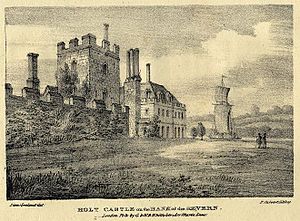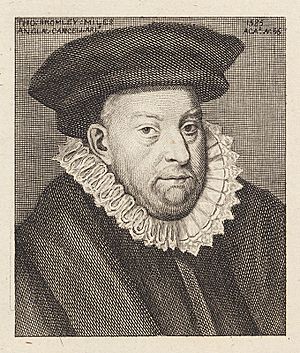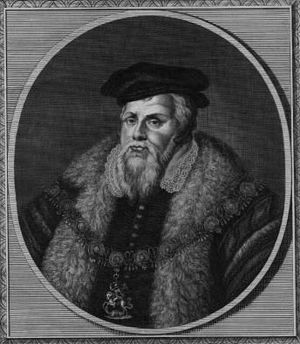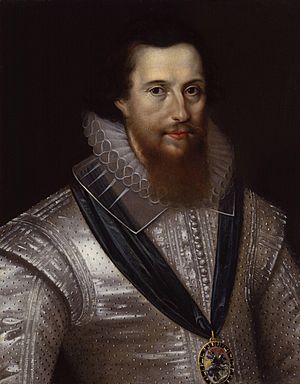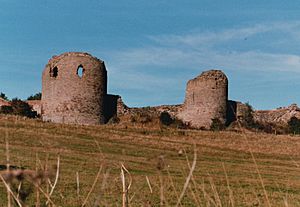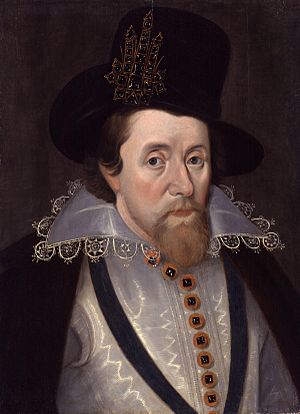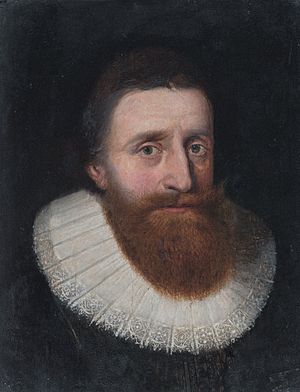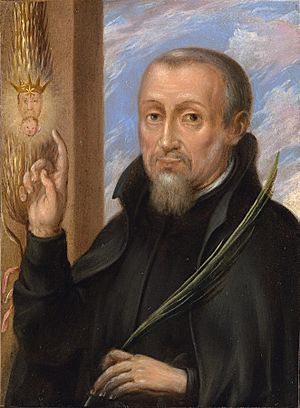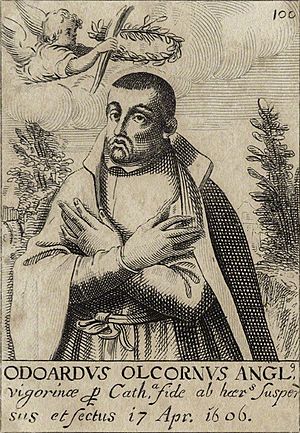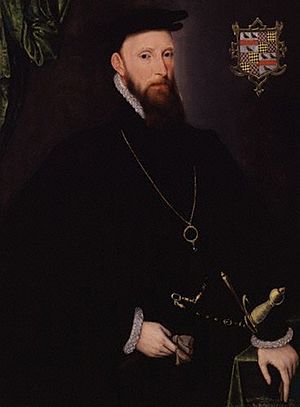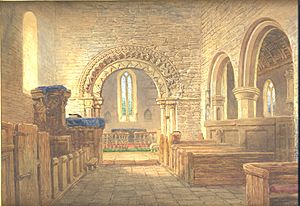Henry Bromley (died 1615) facts for kids
Sir Henry Bromley (born 1560 – died 15 May 1615) was an important English landowner and politician. He was a member of the House of Commons, which is like today's Parliament. He served there at different times between 1584 and 1604. Sir Henry was put in prison twice because of his political actions. The second time was after a big event called the Essex Rebellion. Later, during the time of King James I, he regained the king's trust. He played a strong role in stopping the famous Gunpowder Plot.
Contents
Early Life and Family
Henry Bromley was the oldest son of Thomas Bromley. His father was a very important person called the Lord Chancellor. Henry's mother was Elizabeth Fortescue. Her father was Sir Adrian Fortescue.
Henry started studying at Hart Hall, Oxford when he was 16 years old in 1576. He later joined the Inner Temple in 1580. This was a place where future lawyers and politicians studied. His father, the Lord Chancellor, helped him get in easily.
Sir Henry's Political Journey
Starting in Parliament
In 1584, Henry Bromley became a Member of Parliament (MP) for Plymouth. Plymouth was a busy port city. It was very involved in the war with Spain. The city often supported Protestant ideas. Important MPs from that time included Francis Drake and John Hawkins.
The local leaders in Plymouth chose the MPs. However, Francis Russell, 2nd Earl of Bedford had a lot of power there. He was a close friend of Henry's father. So, the Earl of Bedford helped Henry get elected.
The Earl died in 1585. But Henry was still re-elected as MP for Plymouth in 1586. Henry's father was also friends with powerful trading families. These families likely approved of Henry. This was because his father was close to a group led by Robert Dudley, 1st Earl of Leicester.
The first two Parliaments Henry attended focused on the trial of Mary, Queen of Scots. Henry's father played a key role in this. Henry himself joined a group that talked with Queen Elizabeth about the issue in 1586.
Serving His Home County
From about 1591 to 1601, Henry was a Justice of the Peace for Worcestershire. This meant he helped keep law and order. He was also the High Sheriff of Worcestershire from 1591 to 1592. He received the title of 'Sir' (knighted) in 1592.
In 1594, he traveled to Scotland. He represented Queen Elizabeth at the baptism of Prince Henry.
In 1593, Bromley was elected MP for Worcestershire. This was his home county. MPs from this area were usually chosen from local gentry families. The Russell family, who were Protestants, were very influential. Both Bromley and his fellow MP, William Walsh, were known to be strong Protestants.
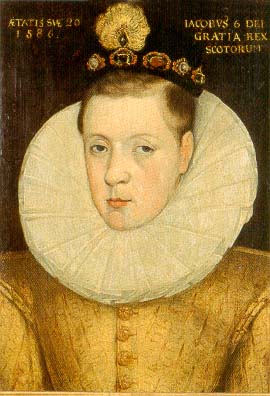
Bromley and Walsh soon joined a plan to discuss who would become the next ruler after Queen Elizabeth. This was a very sensitive topic. The MP leading this idea, Peter Wentworth, had often spoken freely in Parliament. He had even been imprisoned before. Wentworth believed that the country needed to decide on the next ruler. He thought James VI of Scotland should be the successor.
A small group of MPs met to discuss Wentworth's plan. But they were reported to the Queen's advisors. Bromley, Walsh, and others were arrested. They spent most of that Parliament's session in Fleet Prison. They were released in late April. Wentworth refused to apologize and later died in the Tower of London. Meanwhile, Bromley made direct contact with James VI in Scotland.
In 1597, Bromley became an MP for Shropshire. This meant he represented two counties, which was unusual. He owned land in Shropshire. His uncle and cousin had also represented the county before.
He continued as a Justice of the Peace for Shropshire from about 1598. He also worked to find people who refused to follow the official church. In 1598, he helped search for a priest named John Gerard. The next year, he helped find the goods and lands of those who refused to follow the church.
The Essex Rebellion and Imprisonment
Sir Henry Bromley was a strong supporter of Robert Devereux, the Earl of Essex. At this time, there was a big power struggle between Essex and Robert Cecil. Essex wanted to control royal decisions. He tried to gain support by promoting himself as a Protestant hero. He also supported James VI as the next king.
In 1600, Bromley wrote a letter showing his full support for Essex. This letter was caught by Cecil's spies. In it, Bromley said he was ready to do whatever Essex did. He wrote from his home, Holt Castle.
Bromley was also connected to Essex through family. His brother-in-law, John Lyttelton, was an MP for Worcestershire. Lyttelton was allied with Edward Littleton, who managed political matters for Essex in Staffordshire.
Even though Bromley did not take part in the Essex Rebellion on February 8, 1601, he was sent to the Tower of London. He was questioned in May 1601. In June, his name appeared on a list of people who had to pay a fine. He wrote to Robert Cecil from the Tower. He complained that he had made statements when he was tired. He hoped Cecil would help him get his freedom back.
A month later, he wrote again, saying he needed to be released to pay his fine. He said that without Cecil's help, he, his wife, and children would be ruined. In November, he was still in the Tower. He wrote that he was ready to do anything to regain the Queen's favor.
In February 1602, he begged Cecil again to remember his troubles. He asked for his release, saying his family was suffering. By March, he started to get practical. John Lyttelton, his brother-in-law, had died in prison. Lyttelton's lands were supposed to help pay Bromley's fine. But another family member was trying to claim the land. Bromley knew where documents were that could prove this claim wrong. These documents were found.
Bromley was fined and lost his position as Justice of the Peace. He was released in May 1602. He wrote to Cecil again in June about Lyttelton's property. Bromley, who seemed innocent of any direct involvement in the rebellion, was held in prison for a long time.
Back in Favor with the King
When Queen Elizabeth died in 1603, Bromley was one of the first people to travel north to meet the new King James. He was seen as someone who had been very loyal to James. A writer at the time noted that Bromley was known as "Bromley for the Puritan." This meant he was seen as a supporter of the Puritan religious group.
Bromley became a gentleman of the privy chamber. This meant he was a close advisor to the king. He had some influence, partly through his Scottish friends at court. But his power was limited compared to the most powerful people in London. For example, a friend tried to get him a job as a Receiver General, but it never happened. He also had trouble getting grants of land from the king. He was not as skilled at dealing with the powerful people in the central government. However, he remained an effective politician in his local area.
Parliament of 1604
Bromley ran for election in Worcestershire again in 1604. This election was very difficult. A man named John Talbot of Grafton opposed Bromley. But Bromley had the support of many local gentry families. He was elected along with Sir William Lygon.
The 1604 Parliament lasted for seven years. Bromley's son, Thomas Bromley, was elected to the next Parliament in 1614. The Bromley and Lyttelton families became very important in representing Worcestershire in Parliament during the reigns of King James I and Charles I.
In the first part of this Parliament, Bromley was quite active. He joined committees to discuss important issues. These included laws about treason and restoring property to people who had been involved in the Essex rebellion. He also worked on committees about religion. He took part in discussions about uniting England and Scotland.
Stopping the Gunpowder Plot
After the Gunpowder Plot was discovered, King James sent Sir Henry Bromley back to Worcestershire. His job was to help catch the plotters. He did this very well.
The Sheriff, Sir Richard Walsh, led an attack on Holbeche House in November 1605. Bromley took charge of the people captured there. He brought 23 of them to London. Some of the plotters were from the Lyttelton family. It seems Bromley used his family connections to find them.
In January, Bromley's servant helped arrest Robert Wintour and Stephen Littleton at Hagley Hall. This was the home of Bromley's sister, Muriel. It seems her cook gave them a tip.
Around January 20, Bromley was ordered to search Hindlip Hall for Catholic priests. He had to search everywhere, looking for secret hiding places. After some difficulty, two hidden men, Nicholas Owen and Hall, were found and captured. It took another week for Henry Garnet and Edward Oldcorne to come out.
Bromley took the prisoners to London. He waited a bit to let Garnet regain his strength. Garnet later said that Bromley treated him kindly during the journey.
Bromley could not return to Parliament until March. He was active at first, joining a committee about the Gunpowder plotters. After that, his activity in Parliament slowly decreased.
Sir Henry as a Landowner
By 1586, Henry Bromley bought the manor of Great Malvern in Worcestershire. This was a former monastery property. When his father died in 1587, Bromley inherited a lot of land. This included his home, Holt Castle. This was a large manor house, not a medieval fortress. He also inherited lands in Shropshire and Montgomeryshire.
At first, Bromley greatly increased his land. He finished buying the manor of Holt. In 1590, he bought the manor of Powick from the Crown. In 1593, he bought the manor of Upton.
However, Bromley loved learning and spent a lot of money on his interests. This led to him having debts later in life. These debts grew because of the money he lost from his political troubles. Also, his son spent a lot of money. Together, they owed about £5000.
The amount of his fine for supporting Essex was never made public. But it must have been large. He had to get permission to sell land to pay it. He also borrowed money using his Montgomeryshire property as security. His fourth wife, Anne Beswick, was a wealthy widow. The lands he got through his connections at court brought him £5000. Yet, in 1606, he still needed the king to ask for more time to pay his mortgage.
Bromley had to take big steps to reduce his debts. From 1610, he started selling land in Worcestershire. In 1614, he sold the manor of Battenhall. In 1615, just before he died, he had to lease part of his property to others. He also limited his son Thomas to only a life interest in the lands.
Death and Legacy
Sir Henry Bromley died on May 14, 1615. He was 54 years old. He was buried the next day in Holt parish church. His wife built a monument over his grave.
People described Bromley as someone who "loved and favored learning." They said he was religious, kind in his conversations, generous with his hospitality, and helpful to the poor.
Marriages and Family
Sir Henry Bromley married several times. His first wife was Elizabeth Pelham. His second wife was Elizabeth Verney. His third wife was Anne Scott. His fourth wife was Anne Beswick, a wealthy widow. He had at least three sons. One of his sons, Thomas, later became an MP for Worcestershire.
Family Tree
| Family Tree: The Bromleys and Lytteltons, c.1500–1750 | |||||||||||||||||||||||||||||||||||||||||||||||||||||||||||||||||||||||||||||||||||||||||||||||||||||||||||||||||||||||||||||||||||||||||||||||||||||||||||||||||||||||||||||||||||||||||||||||||||||||||||||||||||||||||||||||||||||||||||||||||||||||||||||||||||||||||||||||||||||||||||||||||||||||||||||||||||||||||||||||||||||||||||||||||||||||||||||||||||||||||||||||||||||||||||||||||||||||||||||||||||||||||||||||||||||||||||||||||||||||||||||||||||||||||||||||||||||||||||||||||||||||||||||||||||||||||||||||||||||||||||||||||||||||||||||||||||||||||||||||||||||||||||||||||||||||||||||||||||||||||||||||||||||||||||||||||||||||||||||||||||||||||||||||||||||||||||||||||||||||||||||||||||||||||||||||||||||||||||||||||||||||||||||||||||||||||||||||||||||||||||||||||||||||||||||||||||||||||||||||||||||||||||||||||||||||||||||||||||||||||||||||||||||||||||||||||||||||||||||||||||||||||||||||||||||||||||||||||||||||||||||||||||||||||||||||||||||||||||||||||||||||||||||||||||||||||||||||||||||||
|---|---|---|---|---|---|---|---|---|---|---|---|---|---|---|---|---|---|---|---|---|---|---|---|---|---|---|---|---|---|---|---|---|---|---|---|---|---|---|---|---|---|---|---|---|---|---|---|---|---|---|---|---|---|---|---|---|---|---|---|---|---|---|---|---|---|---|---|---|---|---|---|---|---|---|---|---|---|---|---|---|---|---|---|---|---|---|---|---|---|---|---|---|---|---|---|---|---|---|---|---|---|---|---|---|---|---|---|---|---|---|---|---|---|---|---|---|---|---|---|---|---|---|---|---|---|---|---|---|---|---|---|---|---|---|---|---|---|---|---|---|---|---|---|---|---|---|---|---|---|---|---|---|---|---|---|---|---|---|---|---|---|---|---|---|---|---|---|---|---|---|---|---|---|---|---|---|---|---|---|---|---|---|---|---|---|---|---|---|---|---|---|---|---|---|---|---|---|---|---|---|---|---|---|---|---|---|---|---|---|---|---|---|---|---|---|---|---|---|---|---|---|---|---|---|---|---|---|---|---|---|---|---|---|---|---|---|---|---|---|---|---|---|---|---|---|---|---|---|---|---|---|---|---|---|---|---|---|---|---|---|---|---|---|---|---|---|---|---|---|---|---|---|---|---|---|---|---|---|---|---|---|---|---|---|---|---|---|---|---|---|---|---|---|---|---|---|---|---|---|---|---|---|---|---|---|---|---|---|---|---|---|---|---|---|---|---|---|---|---|---|---|---|---|---|---|---|---|---|---|---|---|---|---|---|---|---|---|---|---|---|---|---|---|---|---|---|---|---|---|---|---|---|---|---|---|---|---|---|---|---|---|---|---|---|---|---|---|---|---|---|---|---|---|---|---|---|---|---|---|---|---|---|---|---|---|---|---|---|---|---|---|---|---|---|---|---|---|---|---|---|---|---|---|---|---|---|---|---|---|---|---|---|---|---|---|---|---|---|---|---|---|---|---|---|---|---|---|---|---|---|---|---|---|---|---|---|---|---|---|---|---|---|---|---|---|---|---|---|---|---|---|---|---|---|---|---|---|---|---|---|---|---|---|---|---|---|---|---|---|---|---|---|---|---|---|---|---|---|---|---|---|---|---|---|---|---|---|---|---|---|---|---|---|---|---|---|---|---|---|---|---|---|---|---|---|---|---|---|---|---|---|---|---|---|---|---|---|---|---|---|---|---|---|---|---|---|---|---|---|---|---|---|---|---|---|---|---|---|---|---|---|---|---|---|---|---|---|---|---|---|---|---|---|---|---|---|---|---|---|---|---|---|---|---|---|---|---|---|---|---|---|---|---|---|---|---|---|---|---|---|---|---|---|---|---|---|---|---|---|---|---|---|---|---|---|---|---|---|---|---|---|---|---|---|---|---|---|---|---|---|---|---|---|---|---|---|---|---|---|---|---|---|---|---|---|---|---|---|---|---|---|---|---|---|---|---|---|---|---|---|---|---|---|---|---|---|---|---|---|---|---|---|---|---|---|---|---|---|---|---|---|---|---|---|---|---|---|---|---|---|---|---|---|---|---|---|---|---|---|---|---|---|---|---|---|---|---|---|---|---|---|---|---|---|---|---|---|---|---|---|---|---|---|---|---|---|---|---|---|---|---|---|---|---|---|---|---|---|---|---|---|---|---|---|---|---|---|---|---|---|---|---|---|---|---|---|---|---|---|---|---|---|---|---|---|---|---|---|---|---|---|---|---|---|---|---|---|---|---|---|---|---|---|---|---|---|---|---|---|---|---|---|---|---|---|---|---|---|---|---|---|---|---|---|---|---|---|---|---|---|---|---|---|---|---|---|---|---|---|---|---|---|---|---|---|---|---|---|---|---|---|---|---|---|---|---|---|---|---|---|---|---|---|---|---|---|---|---|---|---|---|---|---|---|---|---|---|---|---|---|---|---|---|---|---|---|---|---|---|---|---|---|---|---|---|---|---|---|---|---|---|---|---|---|---|---|---|---|---|---|---|---|---|---|---|---|---|---|---|---|---|---|---|---|---|---|---|---|---|---|---|---|---|---|---|---|---|---|---|---|---|---|---|---|---|---|---|---|---|---|---|---|---|---|---|---|---|---|---|---|---|---|---|---|---|---|---|---|---|---|---|---|---|---|---|---|---|---|---|---|---|---|---|---|---|---|---|---|---|---|---|---|---|---|---|---|---|---|---|---|---|---|---|---|---|---|---|---|---|---|---|---|---|---|---|---|---|---|---|---|---|---|---|---|---|---|---|---|---|---|---|---|---|---|---|---|---|---|---|
|
|||||||||||||||||||||||||||||||||||||||||||||||||||||||||||||||||||||||||||||||||||||||||||||||||||||||||||||||||||||||||||||||||||||||||||||||||||||||||||||||||||||||||||||||||||||||||||||||||||||||||||||||||||||||||||||||||||||||||||||||||||||||||||||||||||||||||||||||||||||||||||||||||||||||||||||||||||||||||||||||||||||||||||||||||||||||||||||||||||||||||||||||||||||||||||||||||||||||||||||||||||||||||||||||||||||||||||||||||||||||||||||||||||||||||||||||||||||||||||||||||||||||||||||||||||||||||||||||||||||||||||||||||||||||||||||||||||||||||||||||||||||||||||||||||||||||||||||||||||||||||||||||||||||||||||||||||||||||||||||||||||||||||||||||||||||||||||||||||||||||||||||||||||||||||||||||||||||||||||||||||||||||||||||||||||||||||||||||||||||||||||||||||||||||||||||||||||||||||||||||||||||||||||||||||||||||||||||||||||||||||||||||||||||||||||||||||||||||||||||||||||||||||||||||||||||||||||||||||||||||||||||||||||||||||||||||||||||||||||||||||||||||||||||||||||||||||||||||||||||||
 | Dorothy Vaughan |
 | Charles Henry Turner |
 | Hildrus Poindexter |
 | Henry Cecil McBay |


